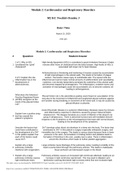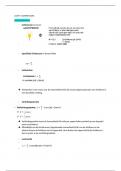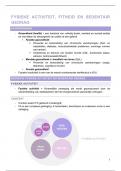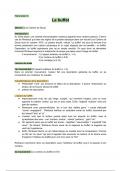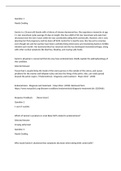-
An Interprofessional Approach 6th Edition by Lynne M. Dunphy, Jill E. Winland
-
Brown, Brian O. Porter, Debera J. Thomas 2 | P a g e TABLE OF CONTENT Unit 01, Chapter 3. Health Promotion ................................ ................................ ................................ ................... 3 Unit 01, Chapter 5. Evidence -Based Care ................................ ................................ ................................ ............. 4 Unit 02, Section 1. Neurological Problems ................................ ................................ ................................ ........... 8 Unit 02, Section 2. Skin Problems ................................ ................................ ................................ ....................... 20 Unit 02, Section 3. Eye Problems ................................ ................................ ................................ ........................ 35 Unit 02, Section 4. Ear, Nose, and Throat Problems ................................ ................................ ........................... 43 Unit 02, Section 5. Respiratory Problems ................................ ................................ ................................ ............ 54 Unit 02, Section 6. Cardiovascular Problems ................................ ................................ ................................ ...... 69 Unit 02, Section 7. Abdominal Problems ................................ ................................ ................................ ............ 84 Unit 02, Section 8. Renal Problems ................................ ................................ ................................ ..................... 96 Unit 02, Section 9. Gender -Related Health Problems ................................ ................................ ....................... 109 Unit 02, Section 10. Musculoskeletal Problems ................................ ................................ ................................ 129 Unit 02, Section 11. Endocrine and Metabolic Problems ................................ ................................ .................. 143 Unit 02, Section 12. Hematological and Immunological Problems ................................ ................................ ... 158 Unit 02, Section 13. Psychosocial Problems ................................ ................................ ................................ ..... 172 Unit 02, Section 14. Urgent Care Problems ................................ ................................ ................................ ....... 191 Unit 03, Chapter 77. Primary Care of Adolescents ................................ ................................ ........................... 206 Unit 03, Chapter 78. Sports Physicals ................................ ................................ ................................ ............... 210 Unit 03, Chapter 79. Primary Care of Patients Who are Transgender ................................ ............................... 215 Unit 03, Chapter 80. Primary Care of Veterans ................................ ................................ ................................ . 217 Unit 03, Chapter 81. Primary Care of the Patient With Cancer ................................ ................................ ......... 221 Unit 03, Chapter 82. Primary Care of Older Adults ................................ ................................ .......................... 223 Unit 03, Chapter 83. Pain Management ................................ ................................ ................................ ............. 228 Unit 03, Chapter 84. Palliative and End -of-life Care ................................ ................................ ......................... 232 Unit 03, Chapter 85. Ethical and Legal Issues of a Caring -Based Practice ................................ ....................... 236 Unit 03, Chapter 86. Quality & Value -Based Payment: Making an Economic Impact on Health Care ........... 242 Unit 03, Chapter 87. Primary Care Approaches to Behavioral Health ................................ .............................. 247 Unit 03, Chapter 88. Putting Caring Into Practice: Caring for Self ................................ ................................ ... 252 3 | P a g e Unit 01, Chapter 3. Health Promotion MULTIPLE CHOICE 1. Which of the following is a primary prevention measure for a 76 -year-old man newly diagnosed with a testosterone deficiency? a. Calcium supplementation b. Testicular self-examination c. Bone density test d. Digital rectal examination ANS: A Feedback: Primary prevention refers to efforts to prevent disease from occurring. In this case, calcium supplementation is an example of primary prevention. Chapter: Chapter 3, Health Promotion Page: 26 Difficulty: Moderate 2. Which of the following is an example of secondary prevention in a 50 -year-old woman? a. Yearly mammogram b. Low animal fat diet c. Use of seat belt d. Daily application of sunscreen ANS: A Feedback: Secondary prevention consists of early screening and detection of disease, such as having a yearly mammogram. Chapter: Chapter 3, Health Promotion Page: 26 Difficulty: Moderate 3. Which of the following is an example of tertiary prevention in a patient with chronic renal failure? a. Fluid restriction b. Hemodialysis 4 days a week c. High -protein diet d. Maintenance of blood pressure at 120/80 ANS: B Feedback: Tertiary prevention is the restoration of health after illness or disease has occurred. Undergoing hemodialysis to treat chronic renal failure is an example of tertiary prevention. Chapter: Chapter 3, Health Promotion Page: 26 Difficulty: Moderate 4. Immunizations are an example of which type of prevention? a. Primary b. Secondary 2 | P a g e c. Tertiary d. Quaternary ANS: A Feedback: Immunizations are an example of primary prevention. They seek to prevent the occurrence of disease. Chapter: Chapter 3, Health Promotion Page: 28 Difficulty: Moderate 5. The nurse is speaking to a patient regarding endemic diseases. Which of these choices describes an endemic statistic? a. The typical incidence of influenza in a country b. The surprise outbreak of malaria in new regions c. Higher levels of Ebola in a country when compared to the previous year d. Abnormal outbreak of measles in pockets of a country ANS: A Feedback: Because influenza rates are occurring at the same frequency as expected based on past history, this is an example of an endemic disease. Chapter: Chapter 3, Health Promotion Page: 36 Difficulty: Moderate 6. The nurse is reviewing old and current trends in disease history. Which of these would be considered an example of a sporadic outbreak? a. The number of people diagnosed with rabies virus in 2017 b. The number of people diagnosed with chlamydia in Texas over a 1 -month period c. The number influenza cases diagnosed from 1918 to 1919 d. The number of common cold cases diagnosed in Washington between October 2016 and March 2017 ANS: A Feedback: A sporadic outbreak occurs when there are occasional cases of an event unrelated in space or time. The best example of this is the number of people diagnosed with rabies virus in 2017. Chapter: Chapter 3, Health Promotion Page: 36 Difficulty: Moderate 7. Which accurately defines incidence rate ? a. The number of old cases of a disease at a point in time b. The number of cases of a disease at a point in time divided by the percentage of the population at a point in time c. The number of total cases of a disease diagnosed at a point in time d. The number of new cases of a disease diagnosed at a point in time ANS: D Feedback: The incidence rate is the number of new cases of a disease diagnosed at a point in time. Chapter: Chapter 3, Health Promotion

